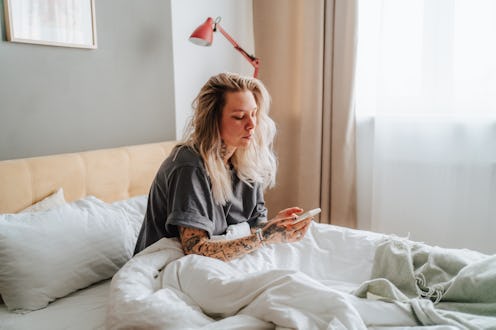Wellness
Here's Why You Wake Up Mad & Confused After A Nap
The post-nap fury is real.

There are two versions of me: the sweet angel who cozies into bed for a peaceful nap, and the absolute demon who wakes up an hour later with fireballs for eyes. While I love the idea of a refreshing snooze, the truth is... naps make me mad. And I know I’m not alone.
On TikTok, a whole lot of people are talking about how they wake up mad after a nap, whether it’s slight crankiness or full-on fury. While some folks feel brand new post-snooze, it’s nice to know I’m not the only one who awakes feeling dizzy, sweaty, and riddled with rage. But still, the urge to nap continues.
When I’m feeling drowsy on, say, a Sunday afternoon, I’ll cricket my feet together under the covers and envision a renewed, more refreshed version of myself. I imagine I’ll drift off, catch some Zzzs, and wake up ready and raring to go.
Instead, I rise two hours later thirsty for revenge. With my hair askew and my head swimming, I’ll wonder what went wrong. Sometimes the crankiness wears off once I start moving. Other times, it sticks around for hours — and it can even throw off the rest of my day.
As someone who would love to take a refreshing nap for once, I set out on a quest for answers.
Naps Aren’t Always Refreshing
According to Dr. Shelby Harris, Psy.D., C.BSM, a licensed clinical psychologist, sleep expert, and director of sleep health at Sleepopolis, you’re way more likely to wake up in a bad mood when you nap for more than 30 minutes. And as a marathon napper, that’s definitely where I go wrong.
Turns out, long naps can lead to something called sleep inertia, which helps explain why some daytime snoozes are the opposite of refreshing. “Sleep inertia is that groggy and disoriented feeling you may experience after waking up from a nap, especially if you slept for too long,” she tells Bustle.
As you snooze, your body travels through different stages of sleep. There’s wakefulness, then N1, N2, N3, and finally REM, or rapid eye movement. Each stage gets progressively deeper, and the whole cycle lasts about 90 minutes before it repeats again.
N1 takes about seven minutes, N2 lasts 10 to 25 minutes, the deep sleep of N3 goes on for 20 to 40 minutes, and REM lasts 10 to 60 minutes. When you nap for longer than half an hour, you run the risk of entering a deeper stage of sleep, says Harris. If you wake up in the middle of deep sleep, it’s likely you’ll feel grumpy and disoriented.
Of course, there are so many factors that contribute to a grizzly mood, like stress and insomnia, but a poorly timed nap clearly doesn’t help.
How To Snooze Like A Pro
Do you also wake up in a bad mood? The next time you feel your eyelids getting heavy midday, grab your phone and set a timer for 10 to 30 minutes, and then allow sleep to whisk you away. By keeping your nap short and sweet, you won’t have time to enter into the deep stage of sleep that makes you groggy and cranky.
If you’re super exhausted and feel like 10 minutes won’t cut it, experts recommend aiming for a two-hour nap — no more, no less. That’s enough time to cycle through all the stages of slumber. And as you circle back around to light sleep, you’ll be less likely to wake up with a nap hangover.
According to Harris, it’s also a good idea to avoid napping after 2 p.m., which is another tip I plan to keep in mind for my future snoozes.
If you’re in desperate need of some shuteye before bedtime, aim for a late morning rest or a quick sleep in the early afternoon. That way you won’t mess with your nighttime sleep schedule — or run the risk of waking up confused after sunset.
While you’re at it, it also helps to step outside or look out the window the moment you wake up. “Exposing yourself to bright light after a power nap can help improve your mood and provide an energy boost,” Harris says. That’s how to wake up feeling refreshed — not ruffled.
Studies referenced:
Blume, C. (2019). Effects of light on human circadian rhythms, sleep and mood. Somnologie, 23(3), 147-156. https://doi.org/10.1007/s11818-019-00215-x
Hilditch, CJ. (2019). Sleep inertia: current insights. Nat Sci Sleep. 2019 Aug 22;11:155-165. doi: 10.2147/NSS.S188911.
Lovato, N. (2010). The effects of napping on cognitive functioning. Prog Brain Res. doi: 10.1016/B978-0-444-53702-7.00009-9.
Patel, AK. (2022). Physiology, Sleep Stages. In: StatPearls [Internet]. Treasure Island (FL): StatPearls Publishing; 2023 Jan-. Available from: https://www.ncbi.nlm.nih.gov/books/NBK526132/.
Source:
Dr. Shelby Harris, Psy.D., C.BSM, licensed clinical psychologist, sleep expert, director of sleep health at Sleepopolis
This article was originally published on